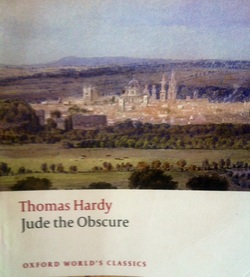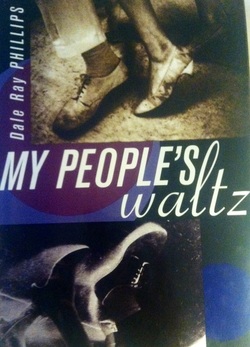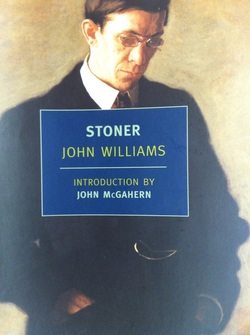
Title: Jude the Obscure
Author: Thomas Hardy
Publication Date: 1895
How I Heard About It: An old teacher
Thomas Hardy’s last novel, Jude the Obscure, is not, in fact, obscure at all. Rather, many readers find it to be the greatest and bleakest (not to say most controversial) novel that the great master ever wrote. Indeed, it was reviewed so harshly when it came out—many called it Jude the Obscene—that it (thankfully[1]) sent Hardy into writing poetry for the rest of his life.
So my one reader will have to forgive me that I am reviewing it here for “Resuscitation” only because it has the word “obscure” in the title and because I just recently read it and want to blog about it.
The novel is not necessarily satirical—at its heart it is a tragic love story—but it is regarded as the most critical novel of the late-Victorian, early-modern age because it attacks English society’s most venerable institutions—the family, the church, and the class system.
Jude Fawley, we learn early, is like many great characters in fiction—obsessive, nearly monomaniacal. But it’s not a white whale or a beauty named Daisy that Jude is after. No, he wants to be a scholar at Oxford (fictionalized here as Christminster), and he “seemed to see his way to living comfortably in Christminster in the course of a year or two, and knocking at the doors of one of those strongholds of learning of which he had dreamed so much.”
He has, as every teacher will recognize, the potential for a great student, and he even takes as his role model the former schoolmaster of his provincial town—one Mr. Phillotson, who leaves for Chrisminter and whom Jude imagines as “promenading at ease [there], like one of the forms in Nebuchadnezzar’s furnace.”
But Christminster remains a pragmatic possibility. He is a poor, orphaned day laborer; and to make matters worse, something happens to him that forever alters the path towards his scholarly dreams.
He gets hit by a pig’s dick.[2]
Yes, that’s right. You heard me loud and clear. And I hope the shock of those words in some small way mimics Jude’s sudden reversal of fortune.
For this pig’s dick has been tossed by a local butcher’s daughter, Arabella Donn, who is sensual enough and cunning enough and randy enough to entrap Jude in a hopeless marriage by faking pregnancy. And Jude being a man of “honor,” which means a man of the times, decides he must do the “honorable thing” and marry her.
It is a terribly short and contentious affair. And oh if the tale has ended there as a short story condemning early passion! But this brief indictment of marriage—Arabella soon leaves with her family for better prospects in Australia—is just the beginning of a Job-like sequence of torture.
Indeed, Jude finally moves to Christminster, with the hope of somehow finagling his way into university studies, only to become enslaved again by his passions and fixated on Sue Bridehead, his cousin. But Sue, in one of the many ironic twists of coincidence in the novel, decides to marry Jude’s old schoolteacher, Mr. Phillotson, and torment Jude with her finicky, back-and-forth acceptance and denial of his love.
Eventually, however, things come to pass. Arabella arrives back on the scene[3] and delivers the news that she and Jude have a son together, a morose little kid nicknamed (over-symbolically) Little Father Time, who is not exactly a character. He is a symbol. And if I believe him to be an artistic mistake[4], I also sort of love his somber questions: “It would be better to be out o’ the world than in it, wouldn’t it?”
This question occurs, in fact, just before the most pivotal scene in the novel, which I won’t spoil here, but which occurs after Sue and Jude have divorced their former spouses and lived together and raised three children.
Little Father Time ruins all. It is almost unbearably bleak.
~
The novel is supposed to be Hardy’s most autobiographical, not least for the reason that Jude undertakes a profession of restoring churches.[5] It is also set in a semi-fictionalized Wessex, a blend of actual and imagined locations like Faulkner’s Yoknapatawpha county.
Indeed, the connection between Hardy and Faulkner—which is more than regionalism—is not lost on me. Both novelists are masters of the scene—chapters, for instance, that read like imbedded short stories.
One of my favorite scenes in Jude was, not ironically, the only happy scene in the entire novel. Jude and Sue, together with their three children, visit an Agricultural Fair, and the scene capture nicely what Hardy, in a poem entitled “Hap,” calls “Blisses about my pilgrimage as pain.”
For when the pain does come at the end of the novel, as it surely must, it comes on strong. And one can’t help but contrast it with those fragile moments of happiness earlier in the novel and earlier in the lives of Sue and Jude.
I was especially moved by the moment in which Jude, pleading with Sue not to leave him, changes his argument on the grounds of self-destruction:
‘O Sue,’ said he with a sudden sense of his own danger. ‘Do not do an immoral thing for moral reasons! You have been my social salvation. Stay with me for humanity’s sake! You know what a weak fellow I am. My two Arch Enemies—my weakness for womankind, and my impulse to strong liquor. Don’t abandon me to them, Sue, to save your soul only!”
But I won’t spoil too much if I tell you this plea doesn’t work. Sue leaves him, and he is left alone to die with Arabella, who has entrapped him again in second marriage, which is even unhappier than the first.
And upon Jude’s death, as Arabella leaves his corpse unattended in order to visit the throngs of people watching a boat-race, who can’t help but think of those first hopeful visions of Christminster, and how tragic they seem now?
Some way within the limits of the stretch of landscape, points of light like the topaz gleamed The air increased in transparency with the lapse of minutes, till the topaz points showed themselves to be the vanes, windows, wet roof slates, and other shining spots upon the spires, domes, freestone-work, and varied outlines that were faintly revealed. It was Christminster, unquestionably; either directly seen, or mirage in the peculiar atmosphere.
The spectator gazed on and on till the windows and vanes lost their shine, going out almost suddenly, like extinguished candles. The vague city became veiled in mist. Turning to the west, he saw that the sun had disappeared. The foreground of the scene had grown funereally dark, and near objects out on the hues and shap
[1] This is not to say that Hardy is not a great novelist. But his supreme triumph is in his poetry.
[2] Dick is not the actual word used. Hardy writes that “a soft cold substance had been flung at him…a piece of flesh, the characteristic part of a barrow-pig, which the countrymen used for greasing their boots”
[3] All of the coincidences in the novel cannot, unfortunately, be chalked up to the smallness of provincial life. I think they are a small flaw in the novel.
[4] Hardy never had kids, which is perhaps why he can’t seem to write believable children characters in this novel.
[5] As it’s been noted before, this is quite an ironic vocation for a non-believer.
Author: Thomas Hardy
Publication Date: 1895
How I Heard About It: An old teacher
Thomas Hardy’s last novel, Jude the Obscure, is not, in fact, obscure at all. Rather, many readers find it to be the greatest and bleakest (not to say most controversial) novel that the great master ever wrote. Indeed, it was reviewed so harshly when it came out—many called it Jude the Obscene—that it (thankfully[1]) sent Hardy into writing poetry for the rest of his life.
So my one reader will have to forgive me that I am reviewing it here for “Resuscitation” only because it has the word “obscure” in the title and because I just recently read it and want to blog about it.
The novel is not necessarily satirical—at its heart it is a tragic love story—but it is regarded as the most critical novel of the late-Victorian, early-modern age because it attacks English society’s most venerable institutions—the family, the church, and the class system.
Jude Fawley, we learn early, is like many great characters in fiction—obsessive, nearly monomaniacal. But it’s not a white whale or a beauty named Daisy that Jude is after. No, he wants to be a scholar at Oxford (fictionalized here as Christminster), and he “seemed to see his way to living comfortably in Christminster in the course of a year or two, and knocking at the doors of one of those strongholds of learning of which he had dreamed so much.”
He has, as every teacher will recognize, the potential for a great student, and he even takes as his role model the former schoolmaster of his provincial town—one Mr. Phillotson, who leaves for Chrisminter and whom Jude imagines as “promenading at ease [there], like one of the forms in Nebuchadnezzar’s furnace.”
But Christminster remains a pragmatic possibility. He is a poor, orphaned day laborer; and to make matters worse, something happens to him that forever alters the path towards his scholarly dreams.
He gets hit by a pig’s dick.[2]
Yes, that’s right. You heard me loud and clear. And I hope the shock of those words in some small way mimics Jude’s sudden reversal of fortune.
For this pig’s dick has been tossed by a local butcher’s daughter, Arabella Donn, who is sensual enough and cunning enough and randy enough to entrap Jude in a hopeless marriage by faking pregnancy. And Jude being a man of “honor,” which means a man of the times, decides he must do the “honorable thing” and marry her.
It is a terribly short and contentious affair. And oh if the tale has ended there as a short story condemning early passion! But this brief indictment of marriage—Arabella soon leaves with her family for better prospects in Australia—is just the beginning of a Job-like sequence of torture.
Indeed, Jude finally moves to Christminster, with the hope of somehow finagling his way into university studies, only to become enslaved again by his passions and fixated on Sue Bridehead, his cousin. But Sue, in one of the many ironic twists of coincidence in the novel, decides to marry Jude’s old schoolteacher, Mr. Phillotson, and torment Jude with her finicky, back-and-forth acceptance and denial of his love.
Eventually, however, things come to pass. Arabella arrives back on the scene[3] and delivers the news that she and Jude have a son together, a morose little kid nicknamed (over-symbolically) Little Father Time, who is not exactly a character. He is a symbol. And if I believe him to be an artistic mistake[4], I also sort of love his somber questions: “It would be better to be out o’ the world than in it, wouldn’t it?”
This question occurs, in fact, just before the most pivotal scene in the novel, which I won’t spoil here, but which occurs after Sue and Jude have divorced their former spouses and lived together and raised three children.
Little Father Time ruins all. It is almost unbearably bleak.
~
The novel is supposed to be Hardy’s most autobiographical, not least for the reason that Jude undertakes a profession of restoring churches.[5] It is also set in a semi-fictionalized Wessex, a blend of actual and imagined locations like Faulkner’s Yoknapatawpha county.
Indeed, the connection between Hardy and Faulkner—which is more than regionalism—is not lost on me. Both novelists are masters of the scene—chapters, for instance, that read like imbedded short stories.
One of my favorite scenes in Jude was, not ironically, the only happy scene in the entire novel. Jude and Sue, together with their three children, visit an Agricultural Fair, and the scene capture nicely what Hardy, in a poem entitled “Hap,” calls “Blisses about my pilgrimage as pain.”
For when the pain does come at the end of the novel, as it surely must, it comes on strong. And one can’t help but contrast it with those fragile moments of happiness earlier in the novel and earlier in the lives of Sue and Jude.
I was especially moved by the moment in which Jude, pleading with Sue not to leave him, changes his argument on the grounds of self-destruction:
‘O Sue,’ said he with a sudden sense of his own danger. ‘Do not do an immoral thing for moral reasons! You have been my social salvation. Stay with me for humanity’s sake! You know what a weak fellow I am. My two Arch Enemies—my weakness for womankind, and my impulse to strong liquor. Don’t abandon me to them, Sue, to save your soul only!”
But I won’t spoil too much if I tell you this plea doesn’t work. Sue leaves him, and he is left alone to die with Arabella, who has entrapped him again in second marriage, which is even unhappier than the first.
And upon Jude’s death, as Arabella leaves his corpse unattended in order to visit the throngs of people watching a boat-race, who can’t help but think of those first hopeful visions of Christminster, and how tragic they seem now?
Some way within the limits of the stretch of landscape, points of light like the topaz gleamed The air increased in transparency with the lapse of minutes, till the topaz points showed themselves to be the vanes, windows, wet roof slates, and other shining spots upon the spires, domes, freestone-work, and varied outlines that were faintly revealed. It was Christminster, unquestionably; either directly seen, or mirage in the peculiar atmosphere.
The spectator gazed on and on till the windows and vanes lost their shine, going out almost suddenly, like extinguished candles. The vague city became veiled in mist. Turning to the west, he saw that the sun had disappeared. The foreground of the scene had grown funereally dark, and near objects out on the hues and shap
[1] This is not to say that Hardy is not a great novelist. But his supreme triumph is in his poetry.
[2] Dick is not the actual word used. Hardy writes that “a soft cold substance had been flung at him…a piece of flesh, the characteristic part of a barrow-pig, which the countrymen used for greasing their boots”
[3] All of the coincidences in the novel cannot, unfortunately, be chalked up to the smallness of provincial life. I think they are a small flaw in the novel.
[4] Hardy never had kids, which is perhaps why he can’t seem to write believable children characters in this novel.
[5] As it’s been noted before, this is quite an ironic vocation for a non-believer.


 RSS Feed
RSS Feed
